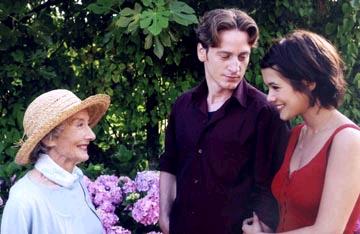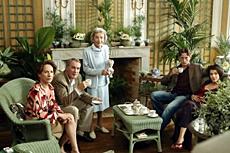The Flower of Evil
(Le Fleur du Mal)


Claude Chabrol, the renowned French New Wave director officially hits fifty films made with The Flower of Evil. That's a grand achievement for anybody, especially for such an esteemed director. However, one of the problems that some fans fall into is that they will blindly like anything that a director with such longevity makes, and The Flower of Evil is such a film. Chabrol's (Merci Pout le Chocolat, The Color of Lies) greatest films were made long ago. He still makes a good film every once in a while, but his best days are probably behind him. Yet, when a film like The Flower of Evil comes out, people will drool all the same, sometimes without regard for how the film actually turns out. One of Chabrol's great joys is exposing and viciously skewering the evils and hypocrisies of the upper class, and he does so again here, yet his criticisms don't feel as sharp as they do.
Pay attention, because this will get complicated. The Flower of Evil begins with the return of Francois Vasseur (Benoit Magimel, The Nest, The Piano Player) from America. He had been there for a couple years, partially because he had been getting extremely close to his first cousin Michele Charpin-Vasseur (Melanie Doutey, The Warrior's Brother, Leila). It turns out that incest is common in this family. Francois' father Gerard's (Bernard Le Coq, Nearest to Heaven, Ferocious) wife died in an accident. So did Michele's father. Her mother Anne Charpin-Vasseur (Nathalie Baye, Catch Me If You Can, Absolutely Fabulous) then married Gerard, so Francois and Michele are also stepsiblings. And, Anne is preparing to run for public office. The matriarch is the kindly Aunt Line (Suzanne Flon, A Crime in Paradise, Children of the Stork).
It seems that the sins of the past in the Charpin-Vasseur clan will forever haunt the present. The intermarrying is the first. Anne's political run revives old stories of Nazi collaboration and murder in Aunt Line's past. Something happens, because Chabrol and co-writers Caroline Eliacheff (Merci Pour le Chocolat, La Ceremonie) and Louise L. Lambrichs begin the film with a murder. In many recent French thrillers, there is more concern about framing a mood than resolving a story, and this is the case here, barely. Chabrol moves things languidly, slowly building a low level of tension around these resurfacing sins. Nevertheless, Chabrol is never able to keep the audience's attention. Everything moves too slowly, for anybody to care.
Of the large cast, Flon does the best. She is world-weary and knows how to take care of herself and her family. She is kindly to everybody, yet it is obvious that there is something darker underneath. Baye is a great actor, but Chabrol doesn't focus on her character. If he did, there would probably be a little more to the story. At it is, it wanders from one family member to the next, refusing to focus. His jabs at the characters feel half-hearted, as if he is doing it more out of habit than anything else.